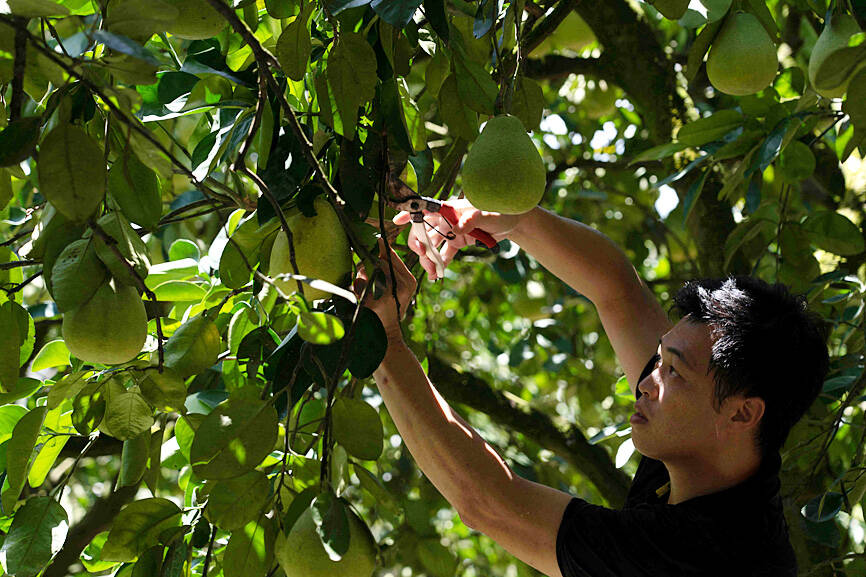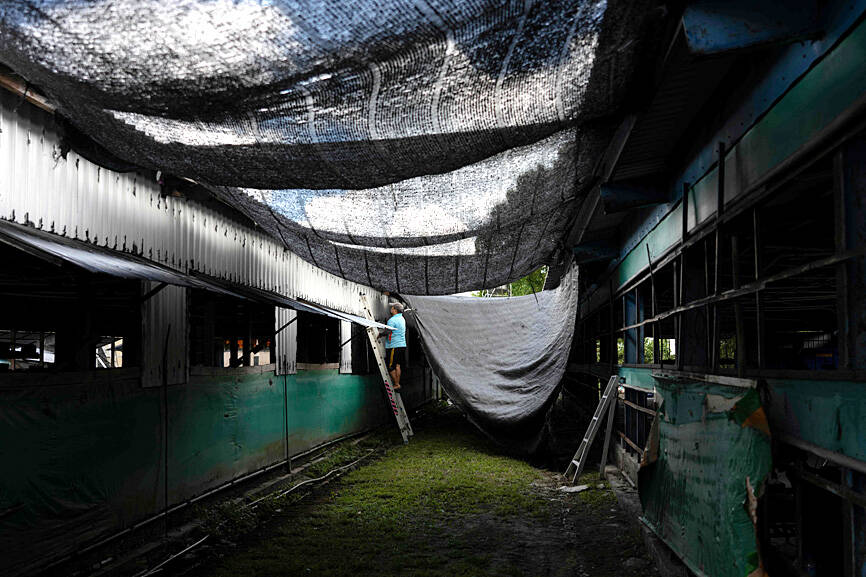As a fighter jet screamed over the lush green fields of Hualien County last week, pomelo farmer Ou Mu-lin sat in his orchard counting the cost of China’s latest push to squeeze the nation.
Cross-strait tensions have risen to their highest level in decades as China rages over a Taiwan visit by US House of Representatives Speaker Nancy Pelosi earlier this month.
Beijing launched drills shortly after Pelosi departed from Taipei, sending missiles into waters around Taiwan, and it torpedoed exports of certain fruit and fish products to China with fresh import bans.

Photo: Asnaya Chou, AFP
The overall impact of China’s latest economic sanctions is limited, but producers such as Ou are paying a painful price.
“Our mainland [China] orders have all been canceled. Our pomeloes have no way of getting there,” he said.
His farm in Hualien’s Ruisui Township (瑞穗) has dispatched about 180,000kg of the citrus fruit to China every year for several decades.

Photo: Asnaya Chou, AFP
“The clients are waiting for the pomeloes, but there’s nothing we can do, it’s a political problem,” he shrugged.
Taiwanese farmers and producers have increasingly had to get used to import bans imposed by Beijing — with Chinese authorities typically citing sudden regulatory discrepancies rather than a direct link to politics.
After Pelosi’s visit, China announced bans on Taiwanese citrus fruit and some mackerel, while halting its own exports to Taiwan of natural sand used in construction.
The month before her visit, it targeted grouper fish, the vast majority of which had previously gone to Chinese consumers.
Taipei said the move was politically motivated, while China claimed it found some fish to be contaminated by banned chemicals.
A year earlier, pineapple imports were halted after Chinese authorities claimed to have discovered pests in shipments, just as the annual harvest was under way.
At a grouper facility in Pingtung County, third-generation farmer Hans Chen of Lijia Green Energy and Biotechnology Co said he would be “severely impacted” if the sanctions were not lifted by the end of the year.
Chen, 35, manages a farm of about 500,000 groupers, and 90 percent of its exports go to China.
He said the ban was imposed without any warning and came at the worst time for producers already bruised by the COVID-19 pandemic.
The fish farmer said his business and others are relying too much on the lucrative Chinese market and need to diversify away from Taiwan’s aggressive neighbor after the surprise ban.
“Everyone felt the COVID-19 situation was slowly improving and the China market is slowly stabilizing and prices will rise again, so there will be ... some profit to make up for the previous losses,” he said. “That’s why everyone’s anxious, and [the sanctions’] effects are very big.”
China remains Taiwan’s largest trading partner, accounting for 28 percent of total exports.
However, the government and businesses have also pushed economic diversification in response to Beijing’s increased aggression under Chinese President Xi Jinping (習近平), the country’s most authoritarian leader in a generation.
Since 2016, President Tsai Ing-wen (蔡英文) has pursued the New Southbound Policy to grow trade with Southeast and other countries in East Asia.
Taiwan is also seeing a surge of sympathy from like-minded democracies in the Asia-Pacific region.
Much of last year’s pineapple harvest was saved when Japanese consumers rushed to purchase “freedom pineapples” in an act of solidarity.
Moreover, China has so far been careful with what it targets.
Taiwan is one of the world’s largest producers of semiconductors, and Beijing has steered clear of hitting a market it leans on to satisfy demand at home.
“China is highly selective in choosing the instruments of economic sanctions against Taiwan,” said Christina Lai (賴潤瑤), a research fellow at Academia Sinica. “It has always refrained from damaging its domestic economy and technology industries. Beijing cannot afford to ban the most crucial imports from Taiwan — semiconductors, high-end instruments or machinery.”
The overall impact on Taiwan’s economy is therefore “very limited,” said Fan Shih-ping (范世平), a professor at National Taiwan Normal University. “It is a political manipulation, as China wants to show it is calling the shots and has control over Taiwan.”
However, for farmers who have become the victims of the latest uptick in tensions, the scale of the sanctions feels seismic.
“We are looking for help from the government, if there’s any way they can help us,” Ou said. “We have to start to find some sales within the country. This is a big headache.”

‘DENIAL DEFENSE’: The US would increase its military presence with uncrewed ships, and submarines, while boosting defense in the Indo-Pacific, a Pete Hegseth memo said The US is reorienting its military strategy to focus primarily on deterring a potential Chinese invasion of Taiwan, a memo signed by US Secretary of Defense Pete Hegseth showed. The memo also called on Taiwan to increase its defense spending. The document, known as the “Interim National Defense Strategic Guidance,” was distributed this month and detailed the national defense plans of US President Donald Trump’s administration, an article in the Washington Post said on Saturday. It outlines how the US can prepare for a potential war with China and defend itself from threats in the “near abroad,” including Greenland and the Panama

A magnitude 4.9 earthquake struck off Tainan at 11:47am today, the Central Weather Administration (CWA) said. The hypocenter was 32.3km northeast of Tainan City Hall at a depth of 7.3km, CWA data showed. The intensity of the quake, which gauges the actual effect of a seismic event, measured 4 in Tainan and Chiayi County on Taiwan's seven-tier intensity scale, the data showed. The quake had an intensity of 3 in Chiayi City and County, and Yunlin County, while it was measured as 2 in Kaohsiung, Nantou County, Changhua County, Taitung County and offshore Penghu County, the data showed. There were no immediate reports of

The Chinese Nationalist Party (KMT) is maintaining close ties with Beijing, the Democratic Progressive Party (DPP) said yesterday, hours after a new round of Chinese military drills in the Taiwan Strait began. Political parties in a democracy have a responsibility to be loyal to the nation and defend its sovereignty, DPP spokesman Justin Wu (吳崢) told a news conference in Taipei. His comments came hours after Beijing announced via Chinese state media that the Chinese People’s Liberation Army’s Eastern Theater Command was holding large-scale drills simulating a multi-pronged attack on Taiwan. Contrary to the KMT’s claims that it is staunchly anti-communist, KMT Deputy

RESPONSE: The government would investigate incidents of Taiwanese entertainers in China promoting CCP propaganda online in contravention of the law, the source said Taiwanese entertainers living in China who are found to have contravened cross-strait regulations or collaborated with the Chinese Communist Party (CCP) could be subject to fines, a source said on Sunday. Several Taiwanese entertainers have posted on the social media platform Sina Weibo saying that Taiwan “must be returned” to China, and sharing news articles from Chinese state media. In response, the Mainland Affairs Council (MAC) has asked the Ministry of Culture to investigate whether the entertainers had contravened any laws, and asked for them to be questioned upon their return to Taiwan, an official familiar with the matter said. To curb repeated